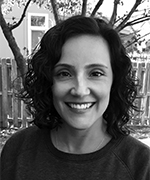By Kari Despain
Never been on the hunt, and dad says I can go with
him and my brothers, my grandpa, my uncles. They wake me
before the sounds of dawn. We are from the desert, so I have no snow
clothes. I borrow my uncle’s long-johns, stuffing them
under my pants, and mom pulls socks over my hands for gloves. Grandpa drives
the old truck up to the canyon, dad pointing out coyotes as we pull over
onto a yellowed grass shoulder. They remind me not to talk but stay
still while the white sun turns the sky apricot above the meadow
where spots of hunter orange dot the hills, and we wait
for the doe that breeches the tree line, beginning to nibble noiselessly
on dry grass nubs. Each orange dot cracks a shot, and the beast fights
to skirt back into juniper. I can’t remember now
if anyone got her. I don’t want to stay, so they take me
back to grandma’s where I sit with my toes at the fire, warming
my fingers around a mug, peering between crystal vases soaking
in purple rays on the sill. Autumn sits smoking
beyond the pane, and I watch it for warmth. That night,
the hunters return victorious, string her
upside down from the apple tree near the swing
set, and my girl cousins screech with delicious fright. It’s too late
to stay up and watch them take her skin, mom says. She promises
to save her heart in a bowl for us to see
in the morning. I wake to find her hanging headless, hollow,
preserved by October frost. A muscular hunk the men can point at
and nod, the neighbors waving from their Chevy to acknowledge
her presence. Mom gathering a saw and butcher paper
for the kitchen table to portion her and write names for parts
like rump roast in magic marker while the guys watch
football and drink soup. The children crowd around a steel kitchen
bowl—the one we use for rolling snickerdoodles—to poke
and squeal at the animal’s heart, jiggling and cold. Touch it,
they say, but when I do, the magic of her,
muscles rippling at daybreak, eyes darting
with her into the brush, disappears.

Kari is a current MFA candidate in fiction at University of Kansas. She loves writing about the locations she grew out of: the wilds of the southwestern United States, the jungles of Trinidad, and the south-central heartland. She and her husband live in the Kansas City area where they are raising five teenage sons and take long walks together because of it. Kari was named a 2016 AWP Intro Journals Project winner in poetry, and her work has been featured in Hayden’s Ferry Review, The Windhover, I-70 Review, Rockvale Review, Penwood Review, and Great Plains Review among others.
